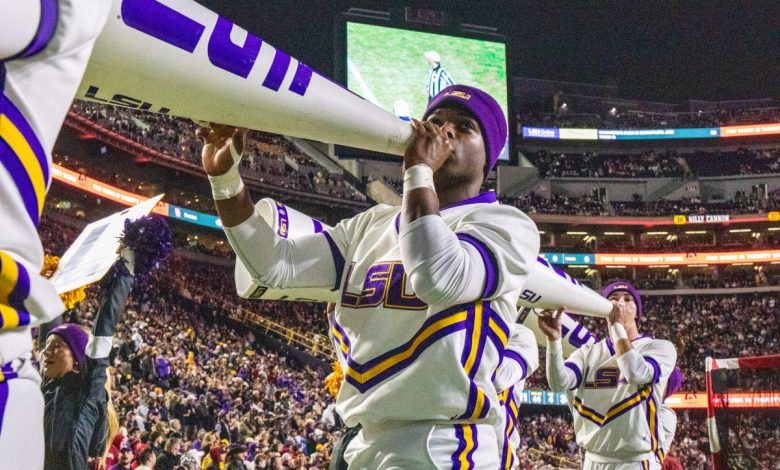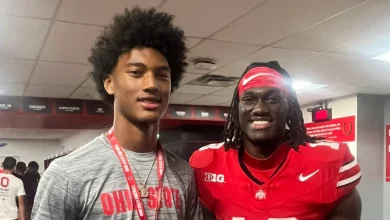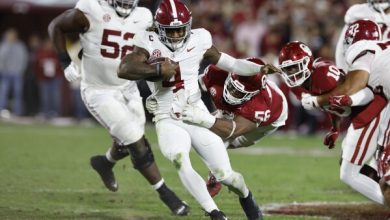Column: The state governor shouldn’t be involved in LSU football operations

In the world of college sports, particularly in the Southeastern Conference (SEC), LSU football holds a prominent place. With its storied history, passionate fan base, and consistently competitive teams, LSU is not just a university program; it’s an institution in Louisiana. The LSU Tigers are woven into the fabric of the state’s identity, and their success or failure often becomes a matter of state pride. This connection between LSU and Louisiana fans is undeniable and has contributed to the program’s status as a cultural touchstone. But recently, a concerning trend has emerged: the state governor becoming increasingly involved in the operations of LSU football. This is a dangerous precedent that could have far-reaching implications not only for LSU’s football program but for the integrity of college athletics as a whole.
Governor’s involvement in college football operations is not new in some states—especially where football is considered more than just a game. However, the delicate balance between state governance and athletic departments must be maintained, or risk undermining the core principles of university independence, academic freedom, and the self-sustaining nature of college sports. It’s time for the state governor to step back from LSU football operations and allow the university to manage its program without undue external interference.
A History of Political Influence
The intersection of politics and college football isn’t a novel concept. In states like Alabama, Texas, and Florida, the immense cultural weight carried by their respective college football programs often leads to local politicians making public pronouncements on coaching hires, team performance, and other related matters. For some, these interventions are seen as an expression of local pride and an attempt to influence the outcome of what feels like a state treasure.
But this is where the danger lies. Governors should focus on governing, not on influencing the day-to-day operations of a university’s athletic programs. When a state’s top political figure involves themselves in decisions like hiring or firing coaches or dictating the direction of the program, it shifts the power dynamic in dangerous ways. The athletic department at LSU, like any other university program, is best equipped to make decisions in the best interest of the school and its student-athletes. Political involvement, especially when it’s motivated by personal or party agendas, undermines this autonomy.
Recently, Governor John Bel Edwards has made headlines for publicly voicing his opinions on LSU football matters. While it’s understandable for a governor to take an interest in the success of a state institution, the level of direct involvement in LSU’s football operations seems both inappropriate and unnecessary. The governor is not a football expert; he is a political leader, and his job is to serve the people of Louisiana, not to micromanage LSU’s athletic department.
The Principle of University Autonomy
One of the most fundamental tenets of higher education in the United States is the principle of university autonomy. This concept ensures that universities are free to make decisions about their internal operations without interference from external political figures. This freedom allows institutions to uphold academic integrity, promote research and education, and operate their athletic programs in ways that align with their institutional values.
When governors or state officials interfere in college football operations, this autonomy is at risk. Decisions about coaching hires, contracts, and other personnel matters should be left to the university administration, including the athletic director and the chancellor. These professionals have the necessary expertise to make informed choices that will benefit the program in the long term.
Moreover, political interference can have unintended consequences. If a governor uses their political power to influence the hiring of a coach or direct decisions within the athletic department, it can lead to poor decisions driven by political motivations rather than sound football logic. The result may be a compromised program that suffers from instability, poor leadership, and ultimately a lack of success on the field.
The Politicalization of LSU Football
The recent wave of governor involvement in LSU football operations also risks politicizing a program that should remain above the fray of partisan politics. College athletics, especially football, have the power to unite people from all walks of life. Whether you’re a Republican or a Democrat, LSU football has the potential to bring the state together in a way that few other institutions can. This unity is one of the reasons why LSU football is so beloved by fans throughout Louisiana.
However, when a governor becomes too closely involved in the workings of the athletic department, it runs the risk of turning LSU football into a political tool. For instance, imagine a scenario in which a governor’s political ally is chosen as the new head coach, or a key decision is made to benefit a specific political constituency. These types of actions could damage LSU’s reputation as a neutral, university-run program and turn its football team into a partisan battleground.
Athletics should transcend politics. At their best, college sports represent the values of hard work, dedication, and teamwork. Coaches, players, and staff members should be motivated by their commitment to excellence and their desire to represent their school with pride. They should not be forced to navigate the complexities of political agendas and the whims of elected officials.
The Case for University-Driven Decision Making
Universities are institutions of higher learning, and as such, they should be allowed to make decisions that align with their educational mission. The athletic department at LSU should be empowered to make decisions about their football program without interference from the governor or any other political figure. The process of selecting a head coach, negotiating contracts, and making personnel decisions should be driven by the expertise of university officials who understand the nuances of college football.
By empowering the athletic director and the university’s leadership team to make decisions without outside political influence, LSU can create a stable and effective football program. The athletic director and other university leaders are well-equipped to evaluate coaching candidates, assess team needs, and navigate the financial complexities that come with running a major football program. The political process, on the other hand, is often more focused on short-term goals, such as securing votes or placating certain constituencies, which may not always align with the best interests of the program.
Furthermore, university-driven decision making fosters accountability. When the athletic department is held accountable for its actions by the university administration, it creates an environment where the focus is on performance, not politics. If the governor is able to step in and influence decisions, the chain of accountability becomes muddled, and the athletic department may find itself making decisions based on external pressure rather than what is best for the program.
The Role of the Governor in Supporting LSU
It’s important to acknowledge that governors play a critical role in supporting universities and their athletic programs. The governor can advocate for funding, infrastructure improvements, and policies that benefit the university as a whole. But this support should be focused on the broader needs of the university, not the day-to-day operations of its football program.
Governor Edwards, for example, has been an advocate for securing state funds for the LSU athletic department, which is a positive and necessary role. However, there is a fine line between advocating for necessary resources and inserting oneself into the decision-making processes that belong within the university’s purview. The governor’s job should be to ensure that LSU has the resources it needs to thrive—not to micromanage the hiring of coaches or make determinations about how the football program should be run.
The Risks of Overreach
When governors overreach into university operations, it sets a dangerous precedent that could lead to further interference in other areas of university life. If a governor can dictate decisions about football, why couldn’t they exert influence over hiring decisions in other sports, academic programs, or even the broader administrative structure of the university? The principle of university autonomy is fragile, and once it is compromised in one area, it becomes easier to justify similar overreach in others.
Furthermore, such overreach may have long-term consequences that go beyond football. Universities are places of learning, innovation, and inquiry, and their independence is crucial to their ability to fulfill their missions. If the government starts to interfere with university operations, it could erode the fundamental values that make higher education in America so strong.









